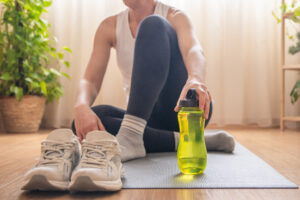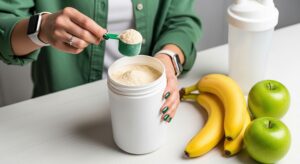Staying hydrated is one of the most overlooked aspects of fitness — yet it’s critical for performance, recovery, and injury prevention. Whether you’re running outdoors, working out at the gym, or recovering from an injury, dehydration can lead to serious consequences. Hydration can have more of an affect on athletic performance than you may think.
We asked Dr. Arth Patel, board-certified Family Medicine and Primary Care Sports Medicine Physician of Advanced Orthopedics and Sports Medicine Institute (AOSMI), to share his top hydration strategies. We will learn how you can prevent muscle cramps and stay energized before, during, and after physical activity.
Why Hydration Matters More Than You Think
An average adult body is made up of about 60% of water (USGS Gov). Mild dehydration can affect your ability to move, think, and perform at your best. Dehydration impacts muscle contractions, joint lubrication, body temperature regulation, and overall energy.
According to Dr. Patel, “If you’re feeling thirsty, you’re already playing catch-up.”
For the average adult, at least 64 ounces of water per day (eight 8-oz glasses) is essential just for baseline function. Athletes and active individuals may need much more — especially in heat or during prolonged activity.

Dr. Patel’s Workout Hydration Plan
Dr. Patel recommends a 3-phase hydration plan — before, during, and after exercise.
1. Before Your Workout:
- Drink 3–4 full glasses of water (24–32 oz) at least 60 minutes before activity
- If exercising outdoors or in the heat, start hydrating earlier in the day
2. During Your Workout:
- Sip water or a low-sugar sports drink every 20 minutes
- For workouts lasting more than 60 minutes, include drinks with electrolytes (like Powerade or Gatorade)
Note that the water intake during a workout benefits you in your recovery, not your workout.
3. After Your Workout:
- Replenish with 2–3 glasses of water (16–24 oz)
- Monitor urine color — it should be light yellow, not dark
What Dehydration Looks Like
(And Why You Shouldn’t Ignore It)
If you regularly experience muscle cramps, dizziness, or early fatigue during workouts, hydration could be the issue.
Common dehydration symptoms include:
- Severe muscle cramps (especially in the legs during activity like biking)
- Dizziness or lightheadedness
- Dry mouth and fatigue
- Dark-colored urine
- Headaches during or after workouts

When to Choose Sports Drinks Over Water
Water is usually sufficient for most moderate workouts. But for extended, high-intensity sessions or workouts in heat, electrolyte replacement is key.
Sports drinks like Powerade and Gatorade contain essential minerals like sodium and potassium to help your muscles function properly.
Dr. Patel notes, “If you’re sweating a lot or training for long periods, you’re not just losing water — you’re losing electrolytes. Replenishing them can make a big difference in how you recover.”
FAQs: Hydration and Exercise
Q: How much water should I drink per day if I work out regularly?
A: Most active adults need more than the standard 64 oz. Dr. Patel recommends up to 80–100 oz/day depending on your body weight, activity level, and climate.
Q: Can I drink too much water?
A: Yes. Overhydration (hyponatremia) is rare but possible. Listen to your body, balance water with electrolytes, and avoid drinking excessive amounts in short time frames.
Q: Are sports drinks better than water?
A: Water is ideal for most short-to-moderate workouts. For longer or high-heat workouts, a low-sugar electrolyte drink can help prevent cramps and support recovery.
Q: What can I do if I still get muscle cramps even when hydrating?
A: Cramping may be related to electrolyte imbalance, fitness level, or underlying conditions. See a sports medicine physician for a personalized plan.
Q: Is thirst a reliable indicator of hydration?
A: Not always. According to Dr. Patel, thirst is often a sign that you’re already dehydrated — so proactive hydration is key.
Don’t Let Dehydration Derail Your Workout
Drinking water sounds simple — but doing it right can be a challenge for a lot of people. Build hydration into your training routine the same way you plan your reps and rest.

About Dr. Arth Patel
Dr. Arth Patel is a board-certified Family Medicine and Primary Care Sports Medicine physician at AOSMI. He works with active patients of all ages to prevent and treat musculoskeletal injuries, improve performance, and support long-term wellness.
Learn more about Dr. Patel →
If you’re experiencing persistent cramps or want a customized hydration strategy based on your health, don’t guess schedule a consultation with Dr. Patel at Advanced Orthopedics and Sports Medicine Institute to get a customized plan tailored to your health and fitness goals.
Disclaimer: Individual hydration needs vary. Always consult your doctor before making major changes to your diet or exercise plan.







